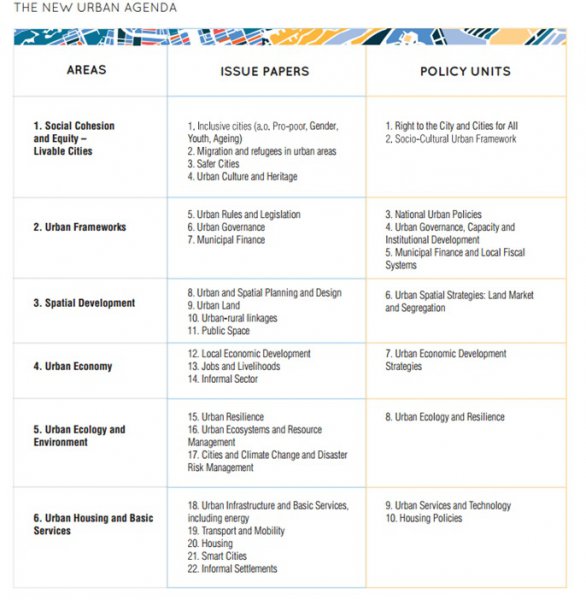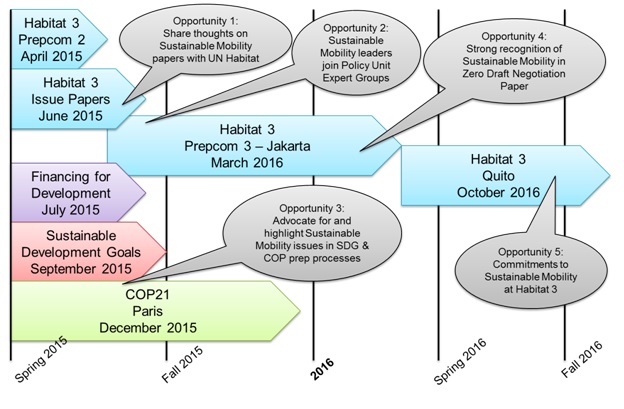Habitat 3 PrepCom 2– Opportunities for Sustainable Mobility
By Holger Dalkmann and Alyssa Fischer from WRI Ross Center of Sustainable Cities
While the Sustainable Development Goals, COP21, and the Road Safety Summit this year have already received a lot of attention, further attention needs to be given to Habitat 3, the third United Nations Conference on Human Settlements in Quito in October 2016. The preparatory process is currently under way, and the opportunity is ripe for the Sustainable Mobility community to influence the conversation. Habitat 3 will set the stage for the cities of the future, and the commitments made in Quito will drive much of the urban development over the coming 20 years.
Last month, I attended PrepCom2, the Second Preparatory Committee of the Habitat 3 process.Though the bulk of the official events revolved around progress reports from numerous countries and civil society organizations, the launch of the issue briefs and the announcements of national, thematic, and regional conferences left many in attendance looking towards the next steps.
In his closing statement, Dr. Joan Clos, UN-Habitat Secretariat, highlighted the UN-Habitat’s priorities of participatory processes, the inclusion of Least Developed Countries in the proceedings, and the connections to this year’s other important global processes, including Financing for Development, the Sustainable Development Goals, and COP. The participation of approximately 850 stakeholders, from country delegations to CSO representatives, shows that there is a strong global consensus around the importance of developing a progressive, inclusive urban development agenda.However, the official inclusion of municipal governments and other local stakeholders remains a point of contention,as no agreement was reached on the official role of cities in the Habitat 3 process.
Moving forward, there are a number of opportunities to raise the profile of sustainable mobility in the conversation. During the Habitat 3 process, the Issue Papers, the Zero Draft Negotiation Paper, and the Policy Unit Expert Groups all represent opportunities for progress. The sustainable mobility community should also seek out other opportunities through the Sustainable Development Goals and COP21 processes
 As part of the Habitat 3 process, 22 Issue Papers will be produced, which will bring together high-level experts to explore state-of-the-art research and analysis,highlight significant challenges and targeted solutions, and develop independent recommendations on particular issues regarding sustainable urban development. The research and composition of these documents will be led by the UN Habitat Task Teams, with contributions from external organizations for publication in June. Contributions to these papers and the subsequent stakeholder discussions in July could be vital avenues to actionable change.The papers, which contribute to understanding along the six primary topic areas shown in the matrix below, are intended to inform the decisions and commitments made by cities, countries, and other decision-makers in the lead-up to PrepCom 3 in Jakarta and the official Habitat 3 in Quito. Initial drafts for several of the papers are available here.
As part of the Habitat 3 process, 22 Issue Papers will be produced, which will bring together high-level experts to explore state-of-the-art research and analysis,highlight significant challenges and targeted solutions, and develop independent recommendations on particular issues regarding sustainable urban development. The research and composition of these documents will be led by the UN Habitat Task Teams, with contributions from external organizations for publication in June. Contributions to these papers and the subsequent stakeholder discussions in July could be vital avenues to actionable change.The papers, which contribute to understanding along the six primary topic areas shown in the matrix below, are intended to inform the decisions and commitments made by cities, countries, and other decision-makers in the lead-up to PrepCom 3 in Jakarta and the official Habitat 3 in Quito. Initial drafts for several of the papers are available here.
While it is difficult to imagine any urban-focused research not touching on the topic of sustainable mobility, 6 of the 22 Issue Papers will likely focus at least partially on transport issues: Safer Cities (Issue Paper 3), Urban and Spatial Planning and Design (Issue Paper 8), Urban Resilience (Issue Paper 15), Urban Infrastructure and Basic Services (Issue Paper 18), Transport and Mobility (Issue Paper 19), and Smart Cities (Issue Paper 21). With the exception of papers 3 and 19, first drafts of all of the papers are available on the Habitat 3 website. Issue papers will be published in June 2015, with online stakeholder discussions to begin in July.
Another key opportunity in the Habitat process will be the Policy Units, which will mobilize experts through topical panels and take advantage of the upcoming regional and thematic meetings. The selection of the ten panels, which align with the six overarching topical areas (see the matrix below), is currently underway and will be completed this month. Experts will be drawn from a variety of fields, including academia, government, civil society, and other regional and international bodies. We will likely see most of the sustainable mobility advocacy come out of the Urban Services and Technology unit, but there is opportunity to raise the profile of mobility issues in many of the ten units. The panels will meet 3 times over the remainder of the Habitat 3 process.
 Moving forward, SLoCaT members will have the opportunity to contribute to these and other important discussions. The National Urban Forums held in many countries, including many of the Least Developed Countries, will facilitate the inclusion of national stakeholders in the assessment of the Progress Report and planning for Quito. Many regions will also hold regional meetings and produce regional reports before the end of 2015. In addition to the next World Urban Forum in Kuala Lumpur, many cities, including Montreal, Mexico City, Cuenca, Barcelona, Tel Aviv, and Johannesburg, will host global thematic meetings in 2015 and 2016. Other opportunities for learning and sustainable urban development advocacy will include the Sustainable Development Goals (SDGs) process, Financing for Development, and COP21.
Moving forward, SLoCaT members will have the opportunity to contribute to these and other important discussions. The National Urban Forums held in many countries, including many of the Least Developed Countries, will facilitate the inclusion of national stakeholders in the assessment of the Progress Report and planning for Quito. Many regions will also hold regional meetings and produce regional reports before the end of 2015. In addition to the next World Urban Forum in Kuala Lumpur, many cities, including Montreal, Mexico City, Cuenca, Barcelona, Tel Aviv, and Johannesburg, will host global thematic meetings in 2015 and 2016. Other opportunities for learning and sustainable urban development advocacy will include the Sustainable Development Goals (SDGs) process, Financing for Development, and COP21.
The SDGs process, which has been underway for several years, is also a key opportunity this year. These goals will set the world’s priorities for development over the coming 15 years, as their predecessors, the Millennium Development Goals, did in 2000. Additionally, the SDGs are sure to inform many of the discussions and commitments made at Habitat 3, which will be finalized only one year before the conference. Habitat 3 commitments will likely reflect the priorities established in the SDGs; thusly, it is vital that the sustainable mobility community advocate for increased visibility of sustainable mobility indicators under the proposed goals, as SLoCaT has been doing, having submitted several letters to the Open Working Group. However, more can still be done to ensure the transport community’s voice is heard.
2015 and 2016 will truly be a period of opportunity to translate our vision into action. The decisions made in the coming year and a half will shape the future of our cities. The opportunity is ripe for cities, nations, and the world to come together around a common goal for what sustainable mobility of the future should be.
To download the full-text of the thought piece, please click here.